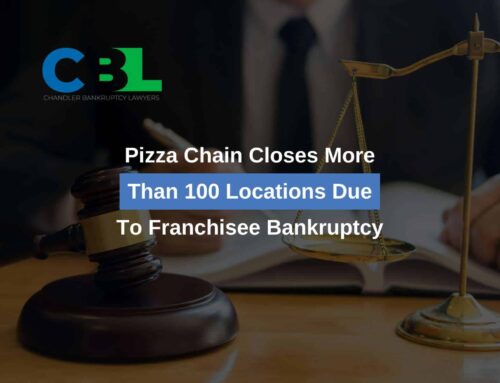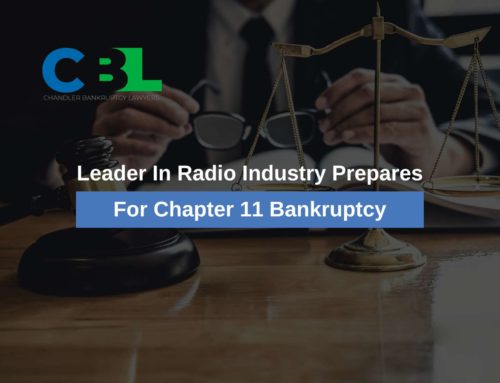Arizona Bankruptcy Law & Exemptions: What Are They?
Many people assume that when you declare bankruptcy, you must give up all of your assets. This is only partially true, and only if you declare Chapter 7 bankruptcy versus Chapter 13 bankruptcy. Each state has bankruptcy exemptions, which are limits on how much equity you can hold in certain types of assets when you file bankruptcy. Failure to property apply these exemptions can have disastrous results in your bankruptcy case. An experienced Chandler bankruptcy attorney can make sure your case runs smoothly so your debts can be discharged as quickly as possible. For your free consultation, use our online form or give us a call at 480-833-8000.

Qualifying For Arizona Bankruptcy & Exemptions
Each state has residency requirements, or minimum amounts of time a person must live in the state before they are eligible to file bankruptcy there. In Arizona, the general residency requirement for bankruptcy is 180 days, or 6 months. However, you must live here for at least 2 years to qualify to use Arizona’s bankruptcy exemptions. If you don’t meet those requirements, you will use the state exemptions from where you lived the greater part of 6 months of the period from 2 years to 2.5 years before your bankruptcy filing. If you don’t meet that state’s exemption requirements, you may use Bankruptcy Code § 522(d). When describing all of Arizona’s exemptions, we will also list the § 522(d) equivalent for comparison purposes. You should consult with a Chandler bankruptcy attorney to confirm which state’s bankruptcy exemptions you are eligible to use. Arizona does not allow for the use of federal bankruptcy exemptions.
Arizona’s Bankruptcy Exemptions
Bankruptcy exemptions are meant to represent what is a reasonable amount of equity in property and still be allowed to discharge unsecured debts in Chapter 7 bankruptcy. The courts don’t want someone who owns a paid-off mansion or Lamborghini to qualify for Chapter 7 without risking those assets, as they can be sold to pay debts.
- Homestead Exemption: The homestead exemption can only be used on real property in which you reside- for example, you can’t lease an apartment, rent out your home, and apply the homestead exemption to your home. It can, however, be used on a variety of home types, such as houses, condos, townhomes, mobile homes, and more. The homestead exemption in Arizona is $150,000, and this doesn’t increase for married couples like some other exemptions do. 522(d) exemption: $23,675
- Motor Vehicle Exemption: It can be important to keep your vehicle so you can continue to get to work, school, etc. The motor vehicle exemption in Arizona is $6,000. This increases to $12,000 in one vehicle or $6,000 each in two vehicles for married couples. It increases further to $25,000 if you have specialized equipment for a disability in your vehicle. 522(d) exemption: $3,775
- Household Goods and Furnishings Exemption: This exemption applies to a wide range of items you might have around your home. This includes furniture, appliances, silverware, decorations, and more. In Arizona, this exemption is $6,000, and doubles for married couples. 522(d) exemption: $12,625 in the aggregate with no item more than $600, items such as musical instruments and farm equipment fall under this category as well. While this exemption is higher than Arizona’s household goods and furnishings exemption, you’ll see that this extra $625 will quickly be eaten up by assets for which there are more specific exemptions in Arizona.
- Musical Instruments Exemption: This exemption can be applied to all of a family’s musical instruments with a value of less than $400. This increases to $800 for married filers. 522(d) exemption: Must use Household Goods and Furnishings Exemption
- Wearing Apparel Exemption: In Arizona, the wearing apparel, or clothing, exemption is $500. This doubles to $1,000 for married couples. 522(d) exemption: Must use Household Goods and Furnishings Exemption
- Pets and Animals Exemption: Pets, horses, cows, and poultry with a fair market value of up to $500 are protected for individual filers, and $1,000 for married filers. 522(d) exemption: Must use Household Goods and Furnishings Exemption
- Engagement and Wedding Rings Exemption: Your engagement and wedding bands are protected in an Arizona Chapter 7 bankruptcy up to $2,000 for individuals and $4,000 for married couples. 522(d) exemption: Up to $1,600, applies to jewelry in general
- Personal Library Exemption: This exemption can be used to protect books, manuals, and other published materials. In Arizona, it is $250 for an individual and $500 for married couples. 522(d) exemption: Must use Household Goods and Furnishings Exemption
- Life Insurance Proceeds Exemption: This can be payable to the surviving spouse or child of a deceased spouse, parent, or legal guardian. This exemption in Arizona is $20,000 and doesn’t increase for marital status. 522(d) exemption: Protects a “reasonably necessary” amount of such proceeds
- Watch Exemption: Arizona will allow an individual declaring Chapter 7 bankruptcy to keep one watch worth up to $150, which doubles for married couples. 522(d) exemption: Must use jewelry exemption
- Miscellaneous Exemption: Arizona has an exemption of $1,000, which doubles for married couples, that can be applied to a typewriter, computer, bicycle, sewing machine, family bible, 522(d) exemption: Wildcard exemption of $1,250 plus up to $11,850 of any unused homestead exemption
What Happens If My Property’s Value Exceeds The Corresponding Exemption?
In a Chapter 7 bankruptcy, any assets that aren’t protected by exemptions can be taken away by your bankruptcy trustee. Your trustee will sell the asset and use the proceeds to pay down your debts. The trustee also gets to keep a percentage of the sale. You must claim these exemptions in Schedule C – Property Claimed as Exempt. Review your petition before filing to make sure that you have applied the correct exemptions to all your assets.
Bankruptcy exemptions operate differently in a Chapter 13 bankruptcy. Because you will be paying off most or all of your debts in your Chapter 13 payment plan, you will be allowed to keep most of your assets. However, the excess value of any assets above their corresponding exemptions may need to be contributed to your plan. Contact a Chandler bankruptcy attorney to learn more at 480-833-8000.
Experienced Arizona Bankruptcy Lawyers To Help You Apply Exemptions & More
Exemptions are just one facet of bankruptcy cases that can make them so complicated. Filing without an attorney’s guidance could result in your assets being seized, your case being dismissed, or worse. And filing a Chapter 13 bankruptcy without an attorney is almost a guarantee that your case will be dismissed. Instead, you can file with skillful representation that is surprisingly affordable.
Whether you’re filing Chapter 7 or Chapter 13, our Arizona bankruptcy team has payment options available to fit your budget. We offer flexibility in down payments for Chapter 13 bankruptcy cases, as well as low rates in general. Many of our Chapter 7 clients qualify for our innovative ZERO DOWN post-filing payment plan. Guard yourself and your belongings from your creditors by getting your case filed- we offer quick service emergency filings when necessary. To get the process started, fill out our online form or call 480-833-8000 to schedule your free consultation with one of our experienced Arizona bankruptcy lawyers.






